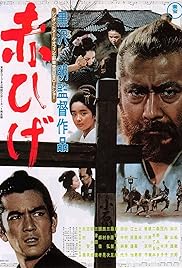RED BEARD (AKAHIGE)
(director/writer: Akira Kurosawa; screenwriters: Masato Ide/Ryuzo Kikushima/Hideo Oguni/Shugoro Yamamoto from the novel “Akahige shinryotan” by Shugoro Yamamoto; cinematographers: Asaichi Nakai/Takao Saito; music: Masaru Sato; cast: Toshiro Mifune (Dr. Kyojio Niide, ‘Akahige’ [‘Red Beard’]), Yuzo Kayama (Dr. Noboru Yasumoto), Tsutomu Yamazaki (Sahachi), Reiko Dan (Osugi), Miyuki Kuwano (Onaka), Kyoko Kagawa (Madwoman), Tatsuya Ehara (Genzo Tsugawa), Terumi Niki (Otoyo), Akemi Negishi (Okuni, the mistress), Yoshio Tsuchiya (Dr. Handayu Mori), Eijiro Tono (Goheiji), Chishu Ryu (Mr. Yasumoto), Takashi Shimura (Tokubei Izumiya), Haruko Sugimura (Kin, the madam), Kinuyo Tanaka (Madame Yasumoto, Noboru’s mother); Runtime: 185; MPAA Rating: NR; producers: Ryûzô Kikushima/Tomoyuki Tanaka; Criterion; 1965-Japan-in Japanese with English subtitles)
“A banal, discursive and overlong Dr. Kildare-like soap opera, that’s no better than General Hospital.“
Reviewed by Dennis Schwartz
A banal, discursive and overlong Dr. Kildare-like soap opera, that’s no better than General Hospital.Director Akira Kurosawa (“Drunken Angel”/”Stray Dog”/”Ran”) works his expertise craftsmanship over this nonsense, but can’t turn such mediocrity into art no matter how skilled he is as a master filmmaker. Kurosawa bases it on the novel “Akahige shinryotan” by Shugoro Yamamoto. The screenplay was written by Kurosawa and his regular writers Masato Ide, Ryuzo Kikushima and Hideo Oguni. It was the last collaboration between Kurosawa and the great iconic actor Toshiro Mifune.
In 1820, young ambitious snobby Dr. Noboru Yasumoto (Yuzo Kayama) arrives in his native Edo after studying in Nagasaki, and aspires to treat the rich and marry a rich man’s daughter. But he’s assigned to intern at a charity clinic run by the aging autocratic Dr. Kyojo Niide, better known as Red Beard (Toshiro Mifune). Under Red Beard’s tough love and wise counseling the insolent Yasumoto reforms and finds unselfish rewards in healing the poor and trying to eliminate poverty. Yasumoto at the end of his internship turns down an offer to be a society doctor, and dedicates his life to helping the poor.
It’s predictable, simplistic, often unbearable in its sentimentality and its social drama yields to a heavy-handed humanitarian message. Enjoyable only to watch Mifune work wonders with such a feeble script, where he even goes samurai crazy in one ridiculous over-the-top scene.
The big-budget b/w personal film of Kurosawa took two years to film and turned out to be in Japan a critical and commercial success. At the Japanese version of the Oscars, Kinema Jumpo, it won for Best Picture and Best Director. At the Venice Film Festival it won for Mifune the Best Actor award.

REVIEWED ON 8/16/2012 GRADE: C+